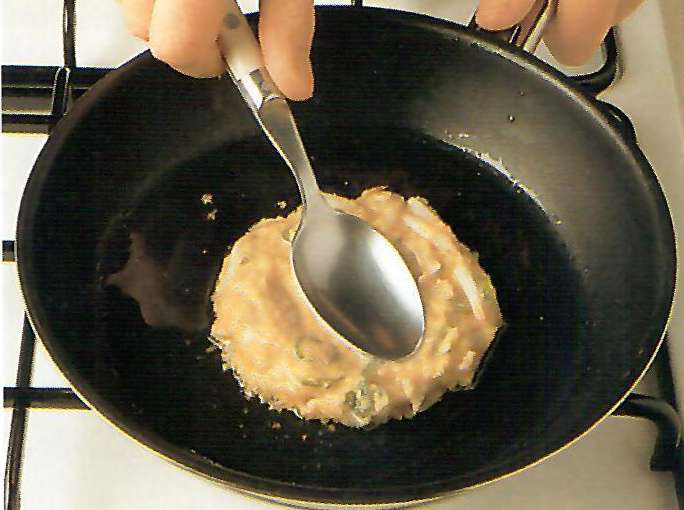Pork and Spring Onion Pancakes
Bindaeduk is sometimes referred to as Korea's answer to the pizza, although it is really a beancake. The filling can include kimchi (pickled cabbage), carrot and ginger, but pork and spring onions are more traditional ingredients.
Ingredients
- 225g / 8oz / 1¼ cups skinned, split mung beans
- 50g / 2oz / ⅓ cup glutinous rice
- 15ml / 1 tbsp light soy sauce
- 15ml / 1 tbsp roasted sesame seeds, crushed
- 2.5ml / ½ tsp bicarbonate of soda
- 115g / 4oz / ½ cup beansprouts, blanched and dried
- 1 garlic clove, crushed
- 4 spring onions, chopped
- 115g / 4oz cooked lean pork, shredded
- 30ml / 2 tbsp sesame oil, plus extra for drizzling
- salt and ground black pepper
- fresh chives, to garnish
- light soy sauce, to serve
Preparation
 |  |  |
- Pick over the mung beans and put them in a bowl. Add the glutinous rice and pour in water to cover. Leave to soak for at least 8 hours. After this time, tip the beans and rice into a sieve, rinse under cold water, then drain. Put the mixture into a food processor and process to a batter with the consistency of double cream.
- Add the soy sauce, sesame seeds and bicarbonate of soda and process briefly to mix. When ready to cook, tip the batter into a bowl and add the beansprouts, garlic, spring onions and pork. Season to taste.
- Heat about 10ml / 2 tsp of the sesame oil in a large frying pan. Spoon or ladle in half the batter, and, using the back of a spoon, spread it into a thick pancake.
- Drizzle a little more sesame oil over the surface of the pancake, cover and cook over a medium heat until the underside is cooked. Invert a lightly oiled plate over the pan. Remove the pan from the heat and, holding both plate and pan tightly together, turn both over carefully so that the pancake is transferred to the plate. Slide it back into the pan and cook on the other side for 3-4 minutes more. Keep this first pancake hot while cooking a second pancake in the same way. Place the pancakes on serving plates and garnish with chives. Cut into wedges and serve with soy sauce.
Serves 4-6.